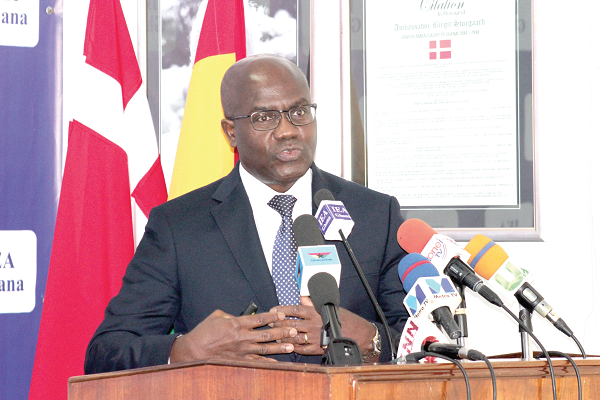
Pass RTI Bill for transparency, accountability
The Institute of Economic Affairs (IEA), has called for the speedy passage of the Right to Information (RTI) Bill to improve the transparency and accountability not only in the petroleum industry but the entire extractive sector.
It also urged Parliament to fast-track work on the Ghana Extractive Industries Transparency Initiative (GHEITI) Bill, the Local Content and Local Participation Bill as well as the Marine Pollution Bill to ensure frequent reporting on oil revenues and expenditure, as well as make oil firms environmentally responsible.
“The GHEITI Bill will enhance governance in the petroleum and other resource industries by placing a legal requirement on them to report revenues, expenditure and other key production data, while the Marine Pollution Bill will ensure that oil companies meet their environmental responsibilities,” the institute said.
Accountability, transparency
Presenting the IEA Petroleum Transparency and Accountability (IEA- P-TRAC) index report 2014 in Accra last Wednesday, a Senior Research Fellow of the IEA, Professor John Asafu-Adjaye, said: “We also advocate a speedy passage of the Budget Act to enhance Parliament’s ability to conduct a comprehensive analysis of the budget.
“The passage of these bills will greatly enhance the level of transparency and accountability not only in the oil and gas sector but also in the other resource industries,” he stated.
The P-TRAC index project was initiated by the IEA in 2011 to monitor transparency and accountability in the management of Ghana’s petroleum resources from 2011 to 2014.
The overall aim of the project is to promote transparency and accountability in the management of the country’s petroleum resources and to enhance the levels of responsibility on the part of policy makers and implementers.
The index focused on four major areas of the oil and gas value chain -- revenue transparency, expenditure transparency, contract transparency and transparency in the management of the Ghana Petroleum Funds.
Revenue transparency
Prof. Asafu-Adjaye noted that since the beginning of oil production in the country in 2011, having access to information pertaining to oil production from the Ghana National Petroleum Corporation, Ministry of Energy, Bank of Ghana and the Ministry of Finance had often been difficult.
To address that challenge, he said there should be more frequent reports by such stakeholders in a form that would be understood by the average citizen to appreciate what is happening.
“In spite of all the information available, if one wants to know how much it costs to produce oil and how much reserves oil companies have, you will never find such information on the website of these state bodies,” he lamented.
He indicated that although rapid progress was made in revenue transparency in the first three years of petroleum production, the rate of progress had slowed over the past three years, especially in the area of institutional environment.
He said while the Petroleum Exploration and Production Bill had been passed into law, the RTI Bill still awaited passage by Parliament, together with other important bills that were currently in draft forms, such as the Ghana Extractive Industries Transparency Initiative Bill and the Marine Pollution Bill.
Expenditure transparency
Prof. Asafu-Adjaye said the IEA had observed no improvement in the frequency and quality of reporting on oil revenue since the IEA’s last report in 2011.
“We find the current practice of providing information on petroleum expenditure in the budget to be inadequate and we strongly advocate the publication of a separate report in a simple language,” he stated.
The IEA senior fellow pointed out that the institution had observed a marginal improvement in the project’s sub-index and that concern had been raised in past P-TRAC reports about the lack of developmental impact of expenditure out of the Annual Budget Funding Amount (ABFA).
“In 2017, the current government decided to concentrate the expenditure on its flagship Free Senior High School (SHS) Policy, with smaller amounts going into agriculture, health and railway infrastructure. There is a need to closely monitor these expenditures to ensure that they are delivering the expected outcomes,” he said.
Contract expenditures
Prof. Asafu-Adjaye noted that of the four components of the P-TRAC index, contract transparency was the only that had seen the least improvement over the past seven years due to the enactment of the Exploration and Petroleum Act (E & P).
“Going forward, the IEA will like to see more public disclosure of contracts and the licensing process. The E & P Act calls for an open and competitive licensing process.
“We note that in the recent contract signed by ExxonMobil, the government made use of a clause in the act that allows it to enter into private negotiations with an international oil company if it is in the public interest,” he said and hoped that such an option would not be the default choice in future contracts.
